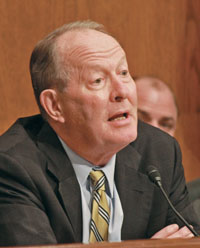Senate suggests Stage 3 MU delay

After a day spent hearing from health IT experts about information blocking practices, Republican Sen. Lamar Alexander, chair of the Senate Health, Education, Labor & Pensions Committee, said Thursday afternoon that he's asked HHS to consider a delay of Stage 3 meaningful use.
Before that hearing on Capitol Hill, Alexander noted he'd heard from many providers that Stage 1 MU had helped spur adoption, that Stage 2 had been a "mixed blessing" – but that Stage 3 was a "whole 'nother kettle of fish."
[See also: Stage 3 meaningful use ignores market realities, says Brookings]
As such, his "instinct," was to tell HHS Secretary Sylvia Burwell, "Let's not go backwards on electronic healthcare records, but let's not impose on physicians and hospitals a system that doesn't work, and which they spend most of their time dreading," said Alexander. "We want something physicians buy into, rather than something they dread."
 That morning, Alexander mentioned he was curious to hear from industry stakeholders about their thoughts on putting the brakes on the rush toward Stage 3 – "not with the idea of backing up on it," he said, "but with the idea of, 'Let's get this right.'"
That morning, Alexander mentioned he was curious to hear from industry stakeholders about their thoughts on putting the brakes on the rush toward Stage 3 – "not with the idea of backing up on it," he said, "but with the idea of, 'Let's get this right.'"
[See also: CMS lays out vision for Stage 3 meaningful use]
The HELP Committee heard testimony from Allscripts CEO Paul Black, DirectTrust CEO David C. Kibbe, MD, and others on one of healthcare's persistent challenges – and a huge impediment to the industry's efforts to move toward more seamless interoperability: information blocking on the part of vendors and providers alike.
There are several scenarios through which such data blocking could occur, said Alexander.
"My usual hospital refuses to share my information," he said. "The electronic systems at both hospitals don't talk to each other. My usual hospital says it will charge Vanderbilt a huge fee to send my electronic records. My usual hospital says it can’t share them for privacy reasons. Or, my usual hospital won’t send them because they cite concerns about data security."
All of those could cause patient harm, he noted – and none of them are acceptable to a government that has spent some $30 billion dollars so far to spur health IT uptake.
Allscripts' Black testified that, despite the bad rap it so often gets, interoperability among vendors and among providers does happen: "It is important to note that there are many examples of providers who have worked through the process of establishing connectivity and are making it work," he said.
"It is true, however, that today not all stakeholders in the healthcare industry seem to be equally motivated to make information liquidity a reality," said Black. "Clinical data exchange is not where it needs to be."
[See also: ONC calls out information blockers]
To get there, he said, there are some big factors that need to be addressed. Among them: an expansion of the standards development process, "building on the real progress underway with guidance from government and allowing the private sector to continuously develop, adopt and modify new standards."
Also, "key constituencies, such as public health registries, labs, state health information exchange organizations and others who are not following available standards in their work, should be required to do so," he added.
Ultimately, however, "the sluggish progress we’re discussing today most closely stems from one critical deficit," said Black: "the lack of a strong business case or a true market driver for interoperability."
From his perspective, Direct Trust's Kibbe told the HELP Committee that "information blocking by healthcare provider organizations and their EHRs, whether intentional or not, is still a problem for some providers wishing to use Direct exchange, as well as for these providers' clinical partners who want to be able to exchange Direct messages and attachments with them, and sometimes fail."
[See also: Direct messaging finding stride, despite hurdles]
Still, he said, the fault for poor data sharing practices – and the onus to improve them – lies mostly with the private sector, not with feds.
"In my opinion, the responsibility for assuring secure interoperable exchange resides primarily with the healthcare provider organizations, not the EHR vendors, and not the government," he said. "Healthcare provider organizations must come to realize that acting in the best interest of patients is to assure that health information follows the patient and consumer to whatever setting will provide treatment, even if that means in a competitor’s hospital or medical practice."
One thing the government can do, however, is to help work with "trade groups, standards and policies organizations, and others to set expectations for interoperability of EHRs and other applications certified as interoperable, especially those that have been federally subsidized within the meaningful use programs," said Kibbe.
Perhaps echoing Alexander's comments about the headlong rush to Stage 3, he said: "Let's finish what we started before moving to more complex solutions that may or may not work."
























